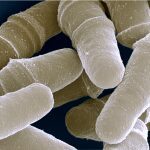Link to Pubmed [PMID] – 18086882
Link to HAL – Click here
Link to DOI – 10.1128/mcb.01651-07
Mol. Cell. Biol. 2008 Feb;28(4):1373-82
DNA polymerases play a central role during homologous recombination (HR), but the identity of the enzyme(s) implicated remains elusive. The pol3-ct allele of the gene encoding the catalytic subunit of DNA polymerase delta (Poldelta) has highlighted a role for this polymerase in meiotic HR. We now address the ubiquitous role of Poldelta during HR in somatic cells. We find that pol3-ct affects gene conversion tract length during mitotic recombination whether the event is initiated by single-strand gaps following UV irradiation or by site-specific double-strand breaks. We show that the pol3-ct effects on gene conversion are completely independent of mismatch repair, indicating that shorter gene conversion tracts in pol3-ct correspond to shorter extensions of primed DNA synthesis. Interestingly, we find that shorter repair tracts do not favor synthesis-dependent strand annealing at the expense of double-strand-break repair. Finally, we show that the DNA polymerases that have been previously suspected to mediate HR repair synthesis (Polepsilon and Poleta) do not affect gene conversion during induced HR, including in the pol3-ct background. Our results argue strongly for the preferential recruitment of Poldelta during HR.

